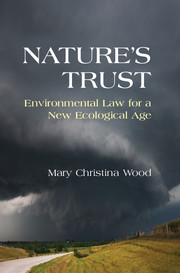Book contents
- Frontmatter
- Dedication
- Contents
- Preface
- Acknowledgments
- Part I Environmental Law: Hospice for a Dying Planet
- Part II The People’s Natural Trust
- Part III The Public Trust and the Great Transition
- 12 Nature’s Trust and the Heart of Humanity
- 13 Using Earth’s Interest, Not Its Principal
- 14 The Public Trust and Private Property Rights
- 15 The New World: A Planetary Trust
- Notes
- Index
14 - The Public Trust and Private Property Rights
Published online by Cambridge University Press: 05 June 2014
- Frontmatter
- Dedication
- Contents
- Preface
- Acknowledgments
- Part I Environmental Law: Hospice for a Dying Planet
- Part II The People’s Natural Trust
- Part III The Public Trust and the Great Transition
- 12 Nature’s Trust and the Heart of Humanity
- 13 Using Earth’s Interest, Not Its Principal
- 14 The Public Trust and Private Property Rights
- 15 The New World: A Planetary Trust
- Notes
- Index
Summary
Natural disasters have a way of trivializing property “ownership.” As when a mile-wide tornado vacuums up a town. An entire town. Or when furnace-hot winds blow a canyon wildfire into a subdivision, or torrential rains swell a river over its banks, or a mudslide buries a neighborhood. Within minutes or hours, homes can turn into piles of toothpicks, or ashes, or debris, or wash away altogether. No, we don’t really “own” property. It owns us.
In his eye-opening book, Eaarth, Bill McKibben identifies what grows more apparent, disaster by disaster: what were once so-called “freak events” now come at us with horrific regularity. Climate change has fundamentally altered our planet. As McKibben puts it, “We have traveled to a new planet, propelled on a burst of carbon dioxide.” He says we might as well call this new planet “Eaarth” (sounds like a groaning Earth). He suggests what should seem obvious by now but still escapes the human psyche: we need new habits for this planet. We need to hunker down, batten down the hatches, pull out the sandbags, fill up the water jugs, hose off the roof. And as this chapter points out, we need to change our conception of property law as well.
- Type
- Chapter
- Information
- Nature's TrustEnvironmental Law for a New Ecological Age, pp. 307 - 334Publisher: Cambridge University PressPrint publication year: 2013



